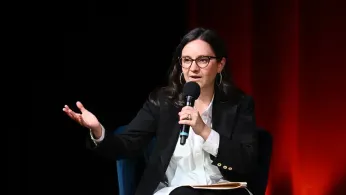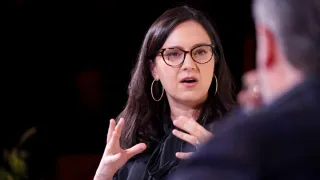
3 hours ago
Who Is Bari Weiss? Charting the Rise of a Controversial Media Power Player
READ TIME: 3 MIN.
Bari Weiss has emerged as one of the most discussed—and debated—voices in U.S. media, recently stepping into the role of editor-in-chief at CBS News, even as she continues to lead The Free Press, a digital media outlet she founded in 2022 . Known for her sharp commentary, Weiss has built a reputation as a fearless critic of both the political left and right, positioning herself at the intersection of journalistic entrepreneurship and public controversy . As an openly queer woman with a wife and daughter, her public identity is often discussed alongside her career milestones, making her trajectory especially relevant to LGBTQ+ audiences .
Bari Weiss was born in Pittsburgh, Pennsylvania, to a Jewish family and began her journalism career with Jewish publications like Haaretz and the Forward . She attended Columbia University, where she became active in campus journalism and political activism, eventually creating the journal "The Current" focused on contemporary politics and Jewish affairs . After graduation, Weiss worked at Tablet Magazine, then became an opinion staff editor at the Wall Street Journal in 2013 .
Her national profile soared during her tenure as an opinion writer and editor at The New York Times from 2017 to 2020 . Her departure from the Times was acrimonious; Weiss claimed she faced "constant bullying by colleagues who disagree with my views," a statement that triggered intense debate across journalistic circles .
In the wake of leaving the Times, Weiss launched a Substack newsletter called Common Sense, quickly scaling it into The Free Press, a digital news outlet known for its opposition to what it characterizes as "cancel culture" and "woke" politics . In 2023, The Free Press was acquired by Paramount Skydance for $150 million, a move that cemented her role as a major media entrepreneur .
Weiss is known for her skepticism toward both right-wing populism and progressive social movements. She has critiqued former President Donald Trump and has also targeted what she calls the "illiberal left" for its approach to free speech and identity politics . Her book, "How to Fight Anti-Semitism," won the 2019 National Jewish Book Award and the Natan Notable Book Award, highlighting her commitment to combating hate and extremism .
Weiss's criticism of "cancel culture" and her vocal support for free speech have made her a polarizing figure, with some lauding her as a defender of open discourse, while others accuse her of downplaying systemic issues around race, gender, and LGBTQ+ rights . Her editorial choices, including who gets a platform at The Free Press, have sometimes drawn criticism from LGBTQ+ activists who argue that certain guests and viewpoints risk legitimizing harmful narratives .
Bari Weiss is openly queer and lives with her wife and daughter in Los Angeles . She has spoken openly about the importance of integrating her Jewish and queer identities into her work, telling the New York Jewish Week, "I never check that at the door" . Her visibility as a queer woman in mainstream media leadership is notable, especially in an industry where LGBTQ+ representation at the executive level remains limited .
However, her positions on issues such as transgender rights, gender identity, and the limits of free speech have sometimes put her at odds with segments of the LGBTQ+ community . Weiss has platformed a range of perspectives on these topics, including some that challenge prevailing progressive views. Critics argue that this editorial stance can inadvertently amplify anti-transgender rhetoric or minimize the lived realities of marginalized LGBTQ+ people . Supporters counter that robust debate is essential for democratic societies and that Weiss’s approach fosters necessary dialogue .
Bari Weiss's ascension to editor-in-chief of CBS News signals a significant moment in American media, as a queer woman with a reputation for challenging dominant narratives takes the helm of a legacy institution . As she steers both CBS News and The Free Press, Weiss is poised to influence national conversations about journalism, free speech, and civic engagement.
For LGBTQ+ audiences, her journey is both inspiring and contentious: inspiring for those who see her as a trailblazer breaking barriers, contentious for those who feel her editorial choices do not always align with the values of inclusion and equity. As the media landscape continues to evolve, Bari Weiss’s leadership and public presence will remain closely watched by queer communities and allies.
Bari Weiss is a complex figure whose career reflects many of the tensions shaping contemporary media and public life. For LGBTQ+ people and communities invested in representation, equity, and robust debate, her trajectory offers both opportunities for solidarity and moments for critical engagement.






